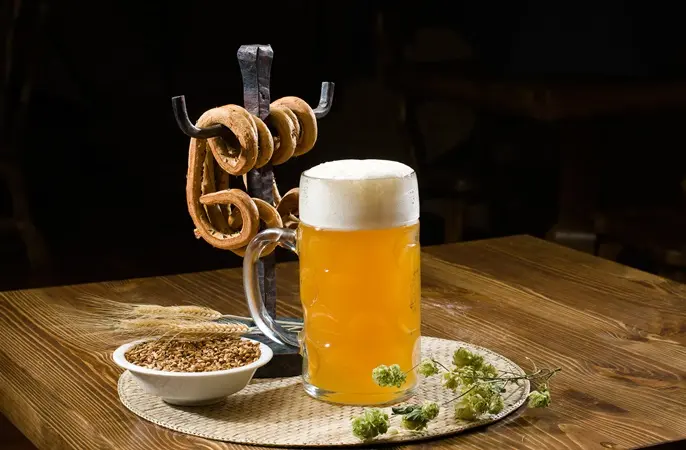I appreciate the nuances of beverages and the social aspects of enjoying a drink after a long day. While my primary passion lies in the world of fine wines, the question of whether it is appropriate or beneficial to drink beer after a workout is an intriguing one that merits exploration. This article will delve into the physiological, nutritional, and social aspects of consuming beer post-exercise, offering a comprehensive perspective on the matter.
The Physiology of Post-Workout Recovery
To understand the implications of drinking beer after a workout, it’s essential to first grasp the basics of what happens to the body during and after exercise. Physical activity, especially strenuous workouts, leads to several physiological changes:
Muscle Fatigue and Microtears:
Intense exercise causes small tears in muscle fibers. Recovery and muscle growth occur as these fibers repair and strengthen.
Dehydration:
Sweating leads to the loss of fluids and electrolytes, which need to be replenished to maintain optimal bodily functions.
Energy Depletion:
Glycogen stores in muscles are depleted during exercise, necessitating replenishment through proper nutrition.
Inflammation:
Exercise-induced inflammation is a natural part of the recovery process, helping to repair tissues but also causing soreness.
Nutritional Needs After a Workout
Post-workout nutrition plays a crucial role in recovery. The primary nutritional needs include:
Hydration:
Rehydration is vital to replace fluids lost through sweat. Water, electrolytes, and minerals are essential.
Protein:
Protein is necessary for muscle repair and growth. Consuming a protein-rich snack or meal post-exercise can enhance recovery.
Carbohydrates:
Carbohydrates help replenish glycogen stores, providing energy for recovery and future workouts.
Antioxidants:
Antioxidants can help reduce exercise-induced oxidative stress and inflammation.
The Composition of Beer
To evaluate whether beer can be a suitable post-workout drink, we must consider its nutritional composition. Beer typically contains:
Water:
Beer is approximately 90-95% water, contributing to hydration.
Carbohydrates:
Beer contains carbohydrates, primarily from malted barley, which can help replenish glycogen stores.
Alcohol:
Alcohol is a diuretic, potentially counteracting the hydration benefits by increasing urine output.
Electrolytes:
Some beers contain small amounts of electrolytes like potassium and sodium, but not in significant quantities compared to sports drinks.
Vitamins and Minerals:
Beer may contain B vitamins and trace minerals from the brewing ingredients.
Pros of Drinking Beer After a Workout
Hydration:
Given its high water content, beer can contribute to rehydration. Moderate consumption may provide some hydration benefits.
Carbohydrate Replenishment:
The carbohydrates in beer can help restore glycogen levels, providing energy for recovery.
Social Enjoyment:
Sharing a beer with friends post-workout can enhance social bonds and contribute to overall well-being.
See Also: Why Does Beer Give You a Beer Belly?
Cons of Drinking Beer After a Workout
Dehydration Risk:
The diuretic effect of alcohol can lead to increased urine production, potentially exacerbating dehydration.
Impaired Recovery:
Alcohol can interfere with protein synthesis and muscle repair, slowing down recovery.
Inflammation:
Alcohol may increase inflammation and oxidative stress, counteracting the natural recovery processes.
Empty Calories:
Beer contains calories without substantial nutritional benefits, which may not align with fitness goals.
Research and Studies
Several studies have investigated the effects of alcohol on post-exercise recovery. Key findings include:
Hydration and Alcohol:
Studies indicate that moderate alcohol consumption can lead to dehydration. Athletes should prioritize water or sports drinks for rehydration.
Muscle Recovery:
Research shows that alcohol can impair muscle protein synthesis, hindering muscle repair and growth.
Performance:
Alcohol consumption post-exercise has been linked to reduced physical performance and delayed recovery.
Guidelines for Beer Consumption After a Workout
If you choose to enjoy a beer after a workout, consider the following guidelines to minimize negative effects and support recovery:
Moderation:
Limit alcohol intake to one or two beers to reduce the risk of dehydration and impaired recovery.
Hydration:
Drink plenty of water alongside beer to stay hydrated. Consider alternating between beer and water.
Nutrition:
Pair beer with a protein-rich snack or meal to support muscle repair. Opt for nutrient-dense foods that aid recovery.
Timing:
Allow some time after exercise before consuming beer. Immediate post-workout nutrition should focus on water, electrolytes, protein, and carbohydrates.
Alcohol-Free Alternatives:
Consider non-alcoholic beers or recovery drinks specifically designed to support hydration and recovery without the drawbacks of alcohol.
The Social Aspect of Drinking Beer After a Workout
Beyond the nutritional considerations, the social aspect of enjoying a beer after a workout can be significant. Social interactions and relaxation contribute to overall well-being. Here are some positive aspects of the social enjoyment of beer post-exercise:
Bonding:
Sharing a beer with workout partners can strengthen social bonds and create a sense of camaraderie.
Relaxation:
The act of relaxing with a beer can help reduce stress and promote mental recovery after intense physical activity.
Celebration:
Enjoying a beer can serve as a reward for completing a challenging workout, enhancing motivation and satisfaction.
Conclusion
The decision to drink beer after a workout depends on individual preferences and priorities. While beer can provide hydration and carbohydrate replenishment, the potential drawbacks of alcohol, such as dehydration and impaired recovery, cannot be ignored. Moderation, proper hydration, and balanced nutrition are key to minimizing negative effects and supporting post-workout recovery.
If you choose to enjoy a beer after your workout, do so mindfully and in moderation. Consider the broader context of your fitness goals and recovery needs, and balance your indulgence with proper hydration and nutrition. Ultimately, the occasional post-workout beer can be part of a well-rounded and enjoyable lifestyle when approached with care and awareness. Cheers to finding the right balance!


